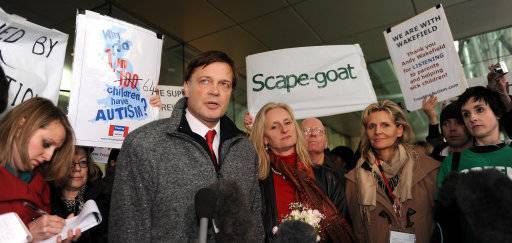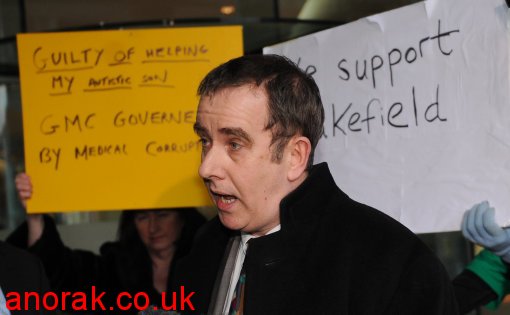Dr Andrew Wakefield And MMR: The Making Of A Media Scare Story
 DR Andrew Wakefield is in the news. Medics are usually only ever in the news when they have killed or are telling us how to live our lives by highlighting another imminent danger. Life is all about risk. Bad doctors are all about fear. And the media loves bad doctors.
DR Andrew Wakefield is in the news. Medics are usually only ever in the news when they have killed or are telling us how to live our lives by highlighting another imminent danger. Life is all about risk. Bad doctors are all about fear. And the media loves bad doctors.
Dr Wakefield told us that the MMR jab was not a good idea. The General Medical Council MMR ruled that Dr Wakefield had acted “unethically” in linking MMR vaccinations and autism. The GMC says he acted “dishonestly and irresponsibly” in doing his research.
Dr Wakefield’s 1998 study made its way into the Lancet. People read. People became afraid. MMR jabs were shunned and as a result more people contracted measles.
That was a mere 12 years ago. If you want to know the toxic effects of a medic telling you something that might not be true, the Daily Mail is a good place to start and end:
MMR crisis could spark measles epidemic – September 2004
The anti-MMR mothers who are putting us all in danger – August 2008
Baby died ten days after being given MMR jab ‘because of failure to warn of possible complications’ – December 2008
Six months after the MMR jab… a bubbly little girl now struggles to speak, walk and feed herself – Jan, 2009
So what are the effects of the doctor’s research:
One of the allegations is he was being paid for advising solicitors on legal action by parents who believed their children had been harmed by MMR. But Dr Wakefield said his role did not involve any clinical work or direct involvement with patients, although he did take part in ward rounds and discussions about research.
What else?
The Lancet paper conceded that the battery of medical tests to which the children were subjected had not established a link, but even the suggestion that the jab could be responsible for autism caused a furore, which worsened when Wakefield suggested to a press conference held to coincide with publication that children should be given the three jabs separately and at least a year apart.
But what was achieved?
So, what are those figures? Thanks to the NHS Information Centre, we now have figures for UK immunisations. And thanks to the World Health Organisation, we can compare those to other countries – and you can see that the UK is down to the levels of Tajikistan and Bangladesh now in % coverage.
As for the research:
In one instance, Dr Wakefield took blood samples from children at his son’s birthday party without the appropriate ethical committee approval and in an ‘inappropriate social setting’.
This is a fun party game. If you don’t lose blood, you’re jut not trying, kids.
He took the blood in return for payments of £5. Dr Wakefield says the GMC ruling is “unfounded and unjust”.
It’s important to note that the council did not rule one way or another on Wakefield’s findings, but rather on his research methods (which included paying children at a birthday party for blood samples and conducting unnecessary and invasive medical tests).
Says the Doctor:
“The allegations against me and my colleagues are unfounded and unjust and I invite anyone to examine the contents of these proceedings and come to their own conclusions….I want to reassure [my supporters] that the science will continue in earnest.”
The science… Do we trust science? Should we?
8280755
Posted: 28th, January 2010 | In: Reviews Comment (1) | TrackBack | Permalink



